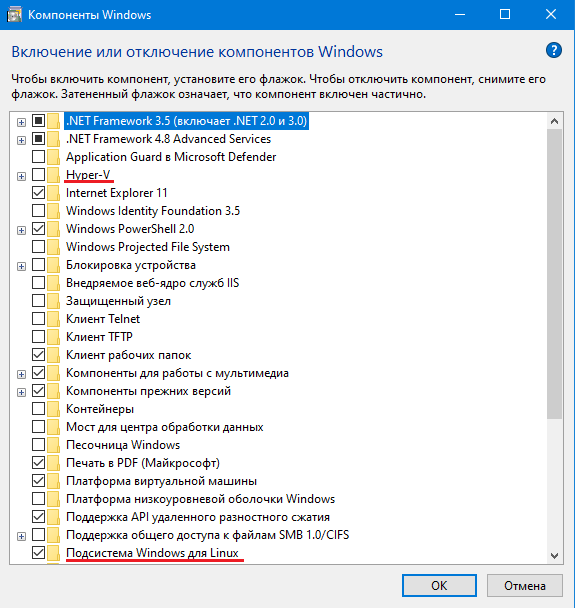WSL2 | Docker | Minikube instalation
WSL2
First of all you should deactivate Hyper-V service and activate WSL2 service into your windows system. Use PowerShell in admin mode:
Disable-WindowsOptionalFeature -Online -FeatureName Microsoft-Hyper-V-Hypervisor
Enable-WindowsOptionalFeature -Online -FeatureName Microsoft-Windows-Subsystem-Linux
Or just do it like this:

Next go to cmd console, update WSL up to 2-nd version and use some commands for instalation Linux system on WSL2:
wsl --status
wsl --update
wsl --set-default-version 2
wsl --list --verbose
wsl --list --online
wsl --install -d Ubuntu-20.04 # wsl --unregister Ubuntu-20.04 (delete)
wsl --set-default Ubuntu-20.04
Official Microsoft mans:
Hyper-V disable | WSL Enabled | WSL manual | WSL basic comands
Now Ubuntu-20.04 installed on your WSL2 service.
Docker
Start bash in linux you’ve just installed and tune the system first. After you should work with apt-get to clean the old packets (just in case), install some utility packets and get new packets from docker repo.
sudo apt-get remove docker docker-engine docker.io containerd runc
sudo apt-get update
sudo apt-get -y install apt-transport-https ca-certificates curl gnupg2 software-properties-common
curl -fsSL https://download.docker.com/linux/ubuntu/gpg | sudo apt-key add -
sudo add-apt-repository "deb [arch=amd64] https://download.docker.com/linux/ubuntu $(lsb_release -cs) stable"
sudo apt-get update
sudo apt-get -y install docker-ce
docker version
sudo usermod -aG docker $USER
sudo service docker start
service --status-all
update-rc.d services defaults # update-rc.d -f service remove
source ~/.bashrc # || exit ?
docker run --rm hello-world
Make sure that console shows you correct info about docker version, docker-service status and the container named hello-world run successfully.
Minikube
Now we can download latest build for your system and install minikube. Check the Minikube official man first and type something like that:
curl -LO https://storage.googleapis.com/minikube/releases/latest/minikube-linux-amd64
sudo install minikube-linux-amd64 /usr/local/bin/minikube
minikube version
minikube start
Make sure that Minikube has latest version and runs correctly.
Then you can install and tune kubectl manualy or get it from minikube dirrectly:
minikube kubectl -- get po -A
minikube kubectl version
Optional
You can use you favorite text editor or CLI and do some optimizations:
nano ~/.bashrc
+alias d='docker'
+alias k='minikube kubectl --'
source ~/.bashrc
or
echo -e "alias d='docker'\nalias k='minikube kubectl --'" >> ~/.bashrc
source ~/.bashrc
Install ssh, git, helm, ansible and so on to be a cool computer guy.
WSL2, Docker and Minikube installed on local machine for your experiments !
Links:
Hyper-V disable | WSL Enabled | WSL manual | WSL basic comands | Docker official man | Minikube official man